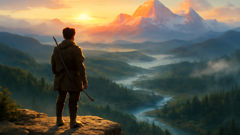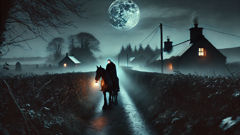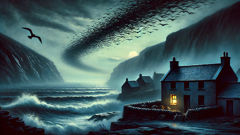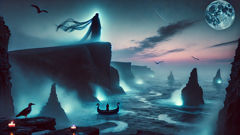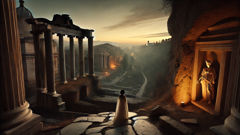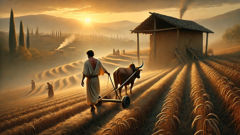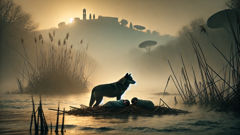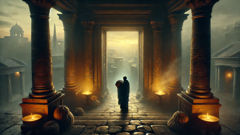Introduction
Between sky and earth, where the Altai Mountains rise like petrified giants along the roof of the world, legend takes on a life as real as the wind’s sigh through the larch forests. Here, stories pass through generations like the tumbling waters of the Katun River—stories of gods and spirits, heroes and monsters, and the wild, restless land itself. In this world shaped by ancient glaciers, a thousand rivers, and the ever-changing moods of nature, the boundaries between the seen and unseen are as thin as morning mist. It is in this primeval land that our tale unfolds—a place where eagles wheel overhead and wolves sing beneath a moon so clear it seems to hold secrets in its glow. The people of Altai, descendants of nomads, herders, and hunters, believe in the spirits of their ancestors, in the wisdom carried by the mountains, and in the promise that even the humblest soul can change the fate of many. Among these people is Kögudei, a young hunter’s son with a spirit as wild and searching as the steppe wind. He knows every gully and stream, every scent of pine and wild thyme, but he has never ventured beyond his valley, nor dared to dream of greatness. Yet the Altai, in their mysterious wisdom, have other plans. When darkness threatens to swallow the mountains and ancient evils stir beneath ice-clad peaks, Kögudei is called by fate—by dreams, by omens, and by the cries of a world on the brink. His journey will test not only his courage but his heart, weaving him into a tapestry of myth older than any living memory. Through dense taiga and storm-swept passes, he will seek allies among spirits and mortals alike, unlocking secrets hidden in the echo of eagle’s wings and the hush of midnight snows. This is the story of Kögudei and the Epic of Altai—a journey of trials, friendship, and the forging of a hero worthy of legend.
A Call from the Sacred Peaks
Kögudei’s life began quietly in the village of Sary-Kol, a huddle of felt yurts at the feet of mountains older than memory. His father was a hunter of reindeer and argali sheep; his mother, a weaver whose fingers told stories in wool. In the long winters, when the wind howled outside and firelight flickered on the walls, Kögudei grew up on tales of old—of Erlik, the Lord of the Underworld, and Ulgan, the wise Sky Father; of shapeshifting spirits and the White Mother Deer who once saved the people from famine. But these were stories for winter nights, not for the waking world of chores, hunting, and tending to the herds.
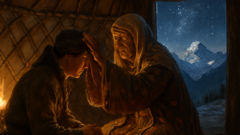
One autumn night, as the birches flamed gold and the cold crept down from the passes, Kögudei dreamed. In his dream, an eagle circled above him, its shadow vast as a storm. From the eagle’s beak fell a single feather, burning with blue fire. Where it touched the earth, the ground split, and black waters surged forth. Voices cried out in terror—a thousand voices, men and women and children—while the mountains bled crimson into the river valleys. Kögudei woke with a shout, heart pounding, the image of the burning feather seared into his mind.
He tried to shake off the dream, but omens followed him. A silver fox crossed his path and vanished; a wild horse, never tamed, nuzzled his hand before galloping into the morning mist. The village shaman, wise and bent with age, called him into her yurt, her eyes milky but piercing. She listened as Kögudei spoke of his dream, then laid her hand upon his brow. “The mountains speak through you,” she whispered. “A shadow rises in the east. You must go—beyond the pass of Karakorum, to the Lake of Spirits. There, destiny awaits.”
Kögudei’s father gave him a bow of horn and sinew, and his mother pressed into his palm a talisman woven with white mare’s hair. “For luck,” she said, though her eyes brimmed with fear and pride. Before dawn, he set out—one figure among endless hills, wrapped in the silence of farewell. As he climbed toward the high passes, the air grew thin and sharp. Eagles soared on the wind, and snow leopards watched from their secret stones. At the threshold of the sacred peaks, he paused and knelt, pressing his forehead to the earth. He whispered a prayer in the old tongue, feeling the pulse of ancient power beneath his hands.
The land beyond Sary-Kol was wilder still: gorges where no sun touched, forests thick with spirits. On the second night, as Kögudei rested by a fire of juniper branches, a shadow slipped from the trees. It was a woman, tall and wild-haired, her eyes silver in the darkness. She spoke in riddles, calling herself Sayan, daughter of the Wind. She warned him of Erlik’s awakening—a darkness that would poison rivers and turn brother against brother. “The White Deer waits at Lake Altyn-Köl,” she said. “Only her blessing can restore the balance.” Then she vanished with the rising wind, leaving only the scent of wild thyme behind.
By dawn, Kögudei’s resolve was set. The call of the sacred peaks echoed in his veins, stronger than fear. He pressed onward into the unknown, every step watched by unseen eyes.
Battles Under the Moon and Brotherhood Forged
The journey to Lake Altyn-Köl was a passage through worlds both mortal and divine. Kögudei crossed meadows where wildflowers painted the earth with splashes of crimson and gold, traversed forests whose pines whispered secrets of ancient wars, and forded rivers that shimmered with the ghosts of drowned warriors. Each day brought a new test. Hunger gnawed at him; storms battered him; his mind played tricks in the endless silence. Yet always, he pressed onward, the memory of his dream—of burning feather and bleeding mountain—pulling him forward.
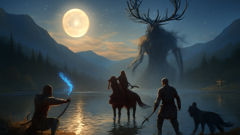
On the fifth night, as he sheltered in a cave, a wolf with fur black as obsidian entered the firelight. Its eyes held intelligence—something more than animal. “Why do you trespass on the sacred ground?” it asked in a voice that seemed to echo from stone and wind. Kögudei did not flinch. “I seek the White Deer at Altyn-Köl. The balance is broken, and the shadow rises.”
The wolf studied him, then spoke: “Many have tried, few return. But you have courage, young one. I will guide you—for a price.”
The wolf became his companion, silent and watchful, leading him through labyrinthine valleys and across icy streams. They faced dangers together: a bridge of rotting wood over a chasm, where spirits wailed from below; a forest where trees bled sap like tears, and spectral figures reached from the gloom. In one valley, a band of brigands ambushed them, drawn by tales of a hero bearing omens. The wolf fought at Kögudei’s side, its jaws flashing with moonlit fire. Kögudei’s arrows flew swift and sure, and together they scattered their foes.
Wounded but alive, Kögudei was tended by a healer named Temir, who had once been a warrior-chief. Temir told him of the rising unrest—tribes feuding over scant pasture, rivers running black, children falling ill. “The world is breaking,” Temir said, “and only one marked by the eagle’s fire can heal it.”
Temir joined their company, his wisdom a balm for Kögudei’s doubts. Soon after, a third companion appeared: Kulan, a young woman with hair like midnight and a voice sharp as a mountain wind. She was a famed horsewoman from the southern steppes, seeking vengeance for her brother, slain by a monstrous spirit haunting the mountain lakes. Together, the four moved as one—hunter, wolf, healer, and horsewoman—bound by shared purpose and deepening friendship.
Under the light of the full moon, they faced their greatest trial yet. The monstrous spirit—a creature with the head of a stag and body of smoke—rose from the waters of a hidden tarn. It shrieked with the voices of the lost. Kulan charged astride her gray stallion, Kögudei loosed arrows wreathed in flame, Temir chanted invocations to Ulgan, and the wolf leapt for the creature’s throat. The battle raged until dawn. At last, Kögudei struck true—a burning feather-shaped arrow piercing the monster’s heart. With a howl that shook the mountains, it dissolved into mist.
Exhausted, battered, but victorious, the companions swore an oath on the shores of the moonlit lake: to finish their quest together, whatever trials remained.
Lake of Spirits: Trials and Transformation
Their path climbed higher into the mountains. The air thinned, wildflowers gave way to lichen and bare rock, and thunder echoed between the peaks. Each companion carried wounds—physical and hidden—but trust grew between them like green shoots after snowmelt.
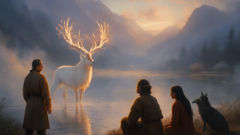
At last, they reached the shore of Lake Altyn-Köl, veiled in morning mist and legend. The water lay still as glass, reflecting the mountains in its depths. Here, it was said, the boundary between worlds was thinnest; spirits gathered to whisper their secrets or demand tribute from mortals who dared approach.
They built a fire of sacred wood, scattered offerings—milk, bread, and white stones—and waited as dusk settled. The wolf prowled the shore; Temir whispered invocations; Kulan kept watch for danger. Kögudei, clutching his mother’s talisman, approached the water alone. He called to the White Deer, voice trembling but strong.
Mist rose from the lake, swirling into shapes—faces of ancestors, figures long dead, heroes and mourners. From within this vision stepped the White Deer: radiant, silver-eyed, antlers crowned with living blossoms. She spoke without words, her gaze searching Kögudei’s soul.
She revealed to him the root of the shadow: Erlik, Lord of the Underworld, had broken his bonds. His envy of the living had poisoned rivers and hearts alike. Only one willing to risk everything—to descend into Erlik’s domain—could restore balance. The White Deer blessed Kögudei and his companions with gifts: courage to face death; insight to see through lies; and, for Kögudei, a single burning feather—the key to unlocking Erlik’s gate.
As dawn broke, the companions prepared for their descent. The White Deer vanished into mist, but her blessing lingered—a warmth against despair. The journey now turned inward as much as outward. Each night, Kögudei’s dreams grew stranger: he saw himself walking beneath the earth, shadows crowding close; he heard his father’s voice calling from far away. He woke in sweat, fear gnawing at him.
But his friends did not falter. Temir reminded him that strength lies not in never fearing, but in moving forward despite fear. Kulan taught him to read the language of clouds and wind; the wolf, to trust his senses beyond sight and sound. Together they found the hidden cave—the entrance to Erlik’s realm, marked by twisted stones and blackened trees.
They entered the darkness hand in hand, hearts pounding but united.
Conclusion
Beneath the earth, all sense of time faded. The companions moved through winding tunnels where shadows whispered and memories flickered across stone walls. At every turn, Erlik’s minions—phantoms of sorrow and rage—tested their resolve. Kögudei faced his own deepest fear: that he was unworthy, a mere hunter’s son lost in legends too vast to bear. But each friend’s voice—Temir’s wisdom, Kulan’s fierce laughter, even the wolf’s silent loyalty—anchored him in hope.
At last, they reached Erlik’s throne room—a cavern lit by black fire, bones piled like mountains, and rivers of shadow flowing at the lord’s feet. Erlik rose, terrible and cold, his gaze a void that threatened to swallow all light. He mocked Kögudei’s courage and tempted him with visions of power. But Kögudei remembered the burning feather—his dream’s promise, his mother’s talisman—and refused Erlik’s offer.
With a cry that echoed through worlds, Kögudei planted the burning feather in the ground. Light erupted—blue as mountain sky—shattering darkness and binding Erlik once more. The cavern trembled; rivers ran clear; lost souls found peace at last.
The companions returned to daylight, changed forever. In Sary-Kol and all across Altai, rivers flowed pure again; tribes set aside their quarrels; children laughed as eagles soared overhead. Kögudei never claimed glory. Instead, he became a bridge—between tribes, between worlds—and the tales of his courage traveled farther than any hunter’s arrow. The Epic of Altai endures: a reminder that even in the wildest lands, hope and unity can light a path through the deepest night.

